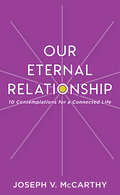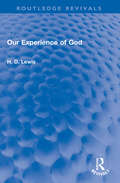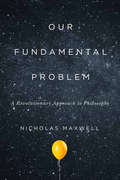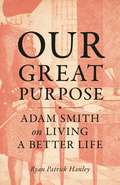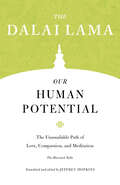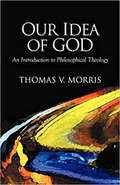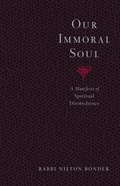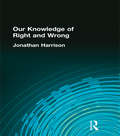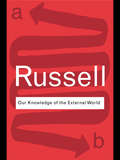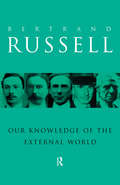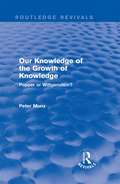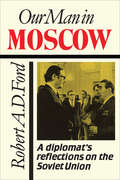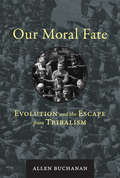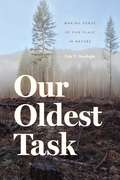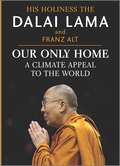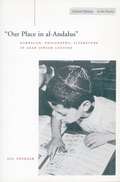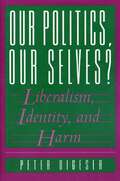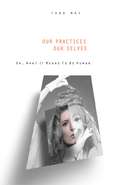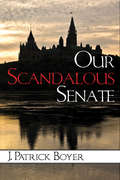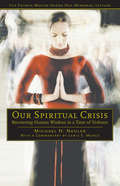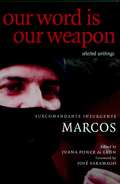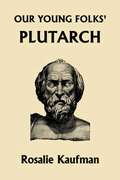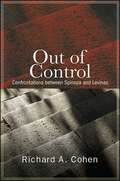- Table View
- List View
Our Eternal Relationship: 10 Contemplations for a Connected Life
by Joseph V. McCarthyMany years ago, Joseph V. McCarthy dreamed a revelation that shattered his world-view and altered his life direction forever. After nine years as a correctional officer in the prison system, Joe left for a monastic life at Tarrawarra Abbey in Victoria, Australia. He lived as a monk for six years, immersed in a life of spiritual contemplation. During this time, he was introduced to “A Course in Miracles”. It’s message of divinity as a tangible force in the world prompted Joe to reflect on its presence in the wider community beyond the cloister. Joe left the monastery and eventually became a training officer for emergency services in a rural/tourist area. While engaged in lost person searches; flood, cliff and car crash rescues; and more, he witnessed tragic misfortune and miraculous survival. His eyes were opened to the fragility of this precious life. In his role as a spiritual director, and later as pastoral carer in a hospital, Joe realised the deep longing in all human hearts for spiritual meaning and peace. He was inspired to write ‘Our Eternal Relationship’, which shares the key insights and contemplations that were so transformative in his journey. From prison officer to monk to emergency rescuer to pastoral carer for the sick and dying, Joseph V. McCarthy has not flinched from witnessing life’s darkest pits of despair. He believes, “There is not a person in this world who does not deserve our sympathy,” and he offers simple steps towards a life of spiritual integrity and contribution, free of religious dogma.
Our Experience of God (Routledge Revivals)
by H. D. LewisFirst published in 1959, Our Experience of God examines the relationship between philosophy and religion. The author argues that, we cannot construct a religion for ourselves out of merely philosophical elements, and that the attempt to provide some philosophical or similar substitute for religion, as it normally presents itself, is misconceived. It brings themes like religion and belief; belief and mystery; religion and transcendence; history and dogma; material factors in religion; symbolism and tradition; art and religion; religion and morality; and encounter and immediacy, to show that the place of philosophy in religion is not to provide proofs for beliefs but to make more explicit for us what is the nature and status of the beliefs we do hold and commend to others. This book will be of interest to scholars and researchers of religion, philosophy, and theology.
Our Fundamental Problem: A Revolutionary Approach to Philosophy
by Nicholas MaxwellHow can the world we live in and see, touch, hear, and smell, the world of living things, people, consciousness, free will, meaning, and value - how can all of this exist and flourish embedded as it is in the physical universe, made up of nothing but physical entities such as electrons and quarks? How can anything be of value if everything in the universe is, ultimately, just physics? In Our Fundamental Problem Nicholas Maxwell argues that this problem of reconciling the human and physical worlds needs to take centre stage in our thinking, so that our best ideas about it interact with our attempts to solve even more important specialized problems of thought and life. When we explore this fundamental problem, Maxwell argues, revolutionary answers emerge for a wide range of questions arising in philosophy, science, social inquiry, academic inquiry as a whole, and - most important of all - our capacity to solve the global problems that threaten our future: climate change, habitat destruction, extinction of species, inequality, war, pollution of earth, sea, and air. An unorthodox introduction to philosophy, Our Fundamental Problem brings philosophy down to earth and demonstrates its vital importance for science, scholarship, education, life, and the fate of the world.
Our Fundamental Problem: A Revolutionary Approach to Philosophy
by Nicholas MaxwellHow can the world we live in and see, touch, hear, and smell, the world of living things, people, consciousness, free will, meaning, and value - how can all of this exist and flourish embedded as it is in the physical universe, made up of nothing but physical entities such as electrons and quarks? How can anything be of value if everything in the universe is, ultimately, just physics? In Our Fundamental Problem Nicholas Maxwell argues that this problem of reconciling the human and physical worlds needs to take centre stage in our thinking, so that our best ideas about it interact with our attempts to solve even more important specialized problems of thought and life. When we explore this fundamental problem, Maxwell argues, revolutionary answers emerge for a wide range of questions arising in philosophy, science, social inquiry, academic inquiry as a whole, and - most important of all - our capacity to solve the global problems that threaten our future: climate change, habitat destruction, extinction of species, inequality, war, pollution of earth, sea, and air. An unorthodox introduction to philosophy, Our Fundamental Problem brings philosophy down to earth and demonstrates its vital importance for science, scholarship, education, life, and the fate of the world.
Our Great Purpose: Adam Smith on Living a Better Life
by Ryan Patrick HanleyInvaluable wisdom on living a good life from the founder of modern economicsAdam Smith is best known today as the founder of modern economics, but he was also an uncommonly brilliant philosopher who was especially interested in the perennial question of how to live a good life. Our Great Purpose is a short and illuminating guide to Smith's incomparable wisdom on how to live well, written by one of today's leading Smith scholars.In this inspiring and entertaining book, Ryan Patrick Hanley describes Smith's vision of "the excellent and praiseworthy character," and draws on the philosopher's writings to show how each of us can go about developing one. For Smith, an excellent character is distinguished by qualities such as prudence, self-command, justice, and benevolence—virtues that have been extolled since antiquity. Yet Smith wrote not for the ancient polis but for the world of market society—our world—which rewards self-interest more than virtue. Hanley shows how Smith set forth a vision of the worthy life that is uniquely suited to us today.Full of invaluable insights on topics ranging from happiness and moderation to love and friendship, Our Great Purpose enables modern readers to see Smith in an entirely new light—and along the way, learn what it truly means to live a good life.
Our Human Potential: The Unassailable Path of Love, Compassion, and Meditation
by The Dalai LamaWhen His Holiness the Dalai Lama gave a series of lectures at Harvard University, they fulfilled magnificently his intention of providing an in-depth introduction to Buddhist theory and practice. He structured the presentation according to the teachings of the Four Noble Truths and expanded their meaning to cover most of the topics of Tibetan Buddhism. The Dalai Lama’s combination of superb intellect, power of exposition, and practical implementation are evident in these lectures. He covers a broad spectrum of topics, including the psychology of cyclic existence, consciousness and karma, techniques for meditation, altruism, valuing enemies, wisdom, and much more. This book was previously published under the title The Dalai Lama at Harvard.
Our Idea of God: An Introduction to Philosophical Theology
by Thomas V. MorrisMany people, even within the ranks of devout religious believers, have only the haziest conception of God. A significant number of such people admit that this vagueness about God bothers them deeply, but that they don't know how to go about getting clearer on this important idea.
Our Immoral Soul: A Manifesto of Spiritual Disobedience
by Nilton BonderRabbi Bonder turns a few conventional ideas on their heads as he identifies the forces at play in individual, social, and spiritual transformation. Many people believe that obedience to the established moral order leads to the well-being of society as well as the salvation of their souls. On the contrary, says Bonder, the human spirit is nourished by the impulse to betray and transgress the ways of the past. Even the Bible legitimizes our God-given urge to disobey in order to evolve, grow, and transcend. It is this "immoral" soul of ours that impels us to do battle with God—and out of this clash, Bonder predicts, a new humanity will emerge. In the course of discussion, he examines a variety of intriguing issues touching on religion, science, and culture, including the findings of evolutionary psychology; the relation of body and soul; infidelity in marriage; the stereotype of Jew as traitor; sacrifice and redemption in Judaism and Christianity; and the Messiah as archetypal transgressor.
Our Knowledge of Right and Wrong (Muirhead Library Of Philosophy Ser.)
by Harrison, JonathanFirst published in 2002. Routledge is an imprint of Taylor & Francis, an informa company.
Our Knowledge of the External World
by Bertrand RussellOur Knowledge of the External World is a compilation of lectures Bertrand Russell delivered in the US in which he questions the very relevance and legitimacy of philosophy. In it he investigates the relationship between ‘individual’ and ‘scientific’ knowledge and questions the means in which we have come to understand our physical world. This is an explosive and controversial work that illustrates instances where the claims of philosophers have been excessive, and examines why their achievements have not been greater.
Our Knowledge of the External World: As A Field For Scientific Method In Philosophy (classic Reprint)
by Bertrand Russell'Philosophy, from the earliest times, has made greater claims, and acheived fewer results than any other branch of learning ... I believe that the time has now arrived when this unsatisfactory state of affairs can be brought to an end' - Bertrand Russell So begins Our Knowledge of the Eternal World, Bertrand Russell's classic attempt to show by means of examples, the nature, capacity and limitations of the logico-analytical method in philosophy.
Our Knowledge of the Growth of Knowledge: Popper or Wittgenstein? (Routledge Revivals)
by Peter MunzPeter Munz, a former student of both Popper and Wittgenstein, begins his comparison of the two great twentieth-century philosophers, by explaining that since the demise of positivism there have emerged, broadly speaking, two philosophical options: Wittgenstein, with the absolute relativism of his theory that meaning is a function of language games and that social configurations are determinants of knowledge; and Popper’s evolutionary epistemology – conscious knowledge is a special case of the relationship which exists between all living beings and their environments. Professor Munz examines and rejects the Wittgensteinian position. Instead, Our Knowledge of the Growth of Knowledge, first published in 1985, elaborates the potentially fruitful link between Popper’s critical rationalism and Neo-Darwinism. Read in the light of the latter, Popper’s philosophy leads to the transformation of Kant’s Transcendental Idealism into ‘Hypothetical Realism’, whilst the emphasis on the biological orientation of Popper’s thought helps to illumine some difficulties in Popper’s ‘falsificationism’.
Our Knowledge of the Past: A Philosophy of Historiography
by Aviezer TuckerHow do historians, comparative linguists, biblical and textual critics and evolutionary biologists establish beliefs about the past? How do they know the past? This book presents a philosophical analysis of the disciplines that offer scientific knowledge of the past. <P><P> Using the analytic tools of contemporary epistemology and philosophy of science the book covers such topics as evidence, theory, methodology, explanation, determination and underdetermination, coincidence, contingency and counterfactuals in historiography. Aviezer Tucker's central claim is that historiography as a scientific discipline should be thought of as an effort to explain the evidence of past events. He also emphasizes the similarity between historiographic methodology to Darwinian evolutionary biology. This is an important, fresh approach to historiography and will be read by philosophers, historians and social scientists interested in the methodological foundations of their disciplines.
Our Man in Moscow: A Diplomat's Reflections on the Soviet Union
by Robert Ford"The world is large; Russia is great; death is inevitable." Almost forty years ago Robert A.D. Ford came across this sentence in a Russian school primer. It stays with him today as an example of the Russian psyche, a psyche that Ford is better equipped to explain than most. He is the only Western diplomat to have known and dealt with all the Soviet leaders from the end of the Second World War to the present: Stalin, Krushchev, Brezhnev, Gorbachev. As a poet and translator of Russian poetry, he also had a special entrée into the Soviet literary world. In this memoir he offers a unique perspective on post-war Soviet politics and Russian life.
Our Moral Fate: Evolution and the Escape from Tribalism (The\mit Press Ser.)
by Allen BuchananA provocative and probing argument showing how human beings can for the first time in history take charge of their moral fate.Is tribalism—the political and cultural divisions between Us and Them—an inherent part of our basic moral psychology? Many scientists link tribalism and morality, arguing that the evolved “moral mind” is tribalistic. Any escape from tribalism, according to this thinking, would be partial and fragile, because it goes against the grain of our nature. In this book, Allen Buchanan offers a counterargument: the moral mind is highly flexible, capable of both tribalism and deeply inclusive moralities, depending on the social environment in which the moral mind operates.We can't be morally tribalistic by nature, Buchanan explains, because quite recently there has been a remarkable shift away from tribalism and toward inclusiveness, as growing numbers of people acknowledge that all human beings have equal moral status, and that at least some nonhumans also have moral standing. These are what Buchanan terms the Two Great Expansions of moral regard. And yet, he argues, moral progress is not inevitable but depends partly on whether we have the good fortune to develop as moral agents in a society that provides the right conditions for realizing our moral potential. But morality need not depend on luck. We can take charge of our moral fate by deliberately shaping our social environment—by engaging in scientifically informed “moral institutional design.” For the first time in human history, human beings can determine what sort of morality is predominant in their societies and what kinds of moral agents they are.
Our Oldest Task: Making Sense of Our Place in Nature
by Eric T. Freyfogle“This is a book about nature and culture,” Eric T. Freyfogle writes, “about our place and plight on earth, and the nagging challenges we face in living on it in ways that might endure.” Challenges, he says, we are clearly failing to meet. Harking back to a key phrase from the essays of eminent American conservationist Aldo Leopold, Our Oldest Task spins together lessons from history and philosophy, the life sciences and politics, economics and cultural studies in a personal, erudite quest to understand how we might live on—and in accord with—the land. Passionate and pragmatic, extraordinarily well read and eloquent, Freyfogle details a host of forces that have produced our self-defeating ethos of human exceptionalism. It is this outlook, he argues, not a lack of scientific knowledge or inadequate technology, that is the primary cause of our ecological predicament. Seeking to comprehend both the multifaceted complexity of contemporary environmental problems and the zeitgeist as it unfolds, Freyfogle explores such diverse topics as morality, the nature of reality (and the reality of nature), animal welfare, social justice movements, and market politics. The result is a learned and inspiring rallying cry to achieve balance, a call to use our knowledge to more accurately identify the dividing line between living in and on the world and destruction. “To use nature,” Freyfogle writes, “but not to abuse it.”
Our Only Home: A Climate Appeal to the World
by Dalai Lama Franz AltSaving the climate is our common duty. With each passing day, climate change is causing Pacific islands to disappear into the sea, accelerating the extinction of species at alarming proportions and aggravating a water shortage that has affected the entire world. In short, climate change can no longer be denied—it threatens our existence on earth.In this new book, the Dalai Lama, one of the most influential figures of our time, calls on political decision makers to finally fight against deadlock and ignorance on this issue and to stand up for a different, more climate-friendly world and for the younger generation to assert their right to regain their future.From the voice of the beloved world religious leader comes an eye-opening manifesto that empowers the generation of today to step up, take action and save our environment.
'Our Place In Al-andalus': Kabbalah, Philosophy, Literature In Arab Jewish Letters (Cultural Memory In The Present)
by Gil AnidjarThe year 1492 is only the last in a series of "ends" that inform the representation of medieval Spain in modern Jewish historical and literary discourses. These ends simultaneously mirror the traumas of history and shed light on the discursive process by which hermetic boundaries are set between periods, communities, and texts. This book addresses the representation of the twelfth and thirteenth centuries as the end of al-Andalus (Islamic Spain). Here, the end works to locate and separate Muslim from Christian Spain, Jews from Arabs, philosophy from Kabbalah, Kabbalah from literature, and texts from contexts. The book offers a reading of texts that emerge from its Andalusi, Jewish, and Arabic cultural sphere: Maimonides' Guide of the Perplexed; the major text of Kabbalah, the Zohar; and the Arabic rhymed prose narrative of Ibn al-Astarkuwi. The author argues that these texts are written in a language that disrupts the possibility of locating it in a pre-existing cultural situation, a recognizable literary tradition, or a particular genre. At stake are issues―texts and contexts―that have gained particular urgency in the writings of such recent thinkers as Walter Benjamin, Jacques Derrida, Giorgio Agamben, Jean-Luc Nancy, and Avital Ronell. The book reads the place and taking place of language, interrogating the notion of disappearing contexts and the view that language is derivative of its true place, the context that, having ended, is mourned as silent and lost.
Our Politics, Our Selves?: Liberalism, Identity, and Harm
by Peter DigeserIs statecraft soulcraft? Should we look to our souls and selves in assessing the quality of our politics? Is it the business of politics to cultivate, shape, or structure our internal lives? Summarizing and answering the major theoretical positions on these issues, Peter Digeser formulates a qualified permission to protect or encourage particular forms of human identity. Public discourse on politics should not preclude talk about the role of reason in our souls or the importance of wholeness and community to our selves or the significance of autonomy for individuals. However, those who seek to place only their own conception of the self or soul within the reach of politics are as mistaken as those who would completely preclude such matters from the political realm.In proposing this view, Digeser responds to communitarians, classical political rationalists, and genealogists who argue that liberal culture fragments, debases, or normalizes our selves. He also critically analyzes perfectionist liberals who justify liberalism by virtue of its ability to cultivate autonomy and authenticity, as well as liberal neutralists who wish to avoid altogether the problem of selfcraft. All these, he argues, fall short in some way in defining the extent to which politics should be concerned with the self.
Our Practices, Our Selves: Or, What it Means to Be Human (G - Reference, Information and Interdisciplinary Subjects)
by Todd MayA book for everyone interested in learning how philosophy is done and what it can tell us about who we are.
Our Scandalous Senate
by J. Patrick BoyerAn in-depth breakdown of the recent wave of Canadian Senate scandals, highlighting the need for abolition. The Senate of Canada was created as a temporary expedient at the time of Confederation, offered as part of the negotiations to bring Canada’s original colonial provinces into the new political union in the mid-1860s. Since then, the original provinces with upper houses abolished them. New provinces were created without second chambers to their legislatures. Only the Parliament of Canada remains stuck with its redundant and irrelevant colonial relic, costly to maintain and out of step with the values of a modern democratic country. Today, the Senate of Canada is rocked by ongoing scandal. News of this far-reaching scandal rightly disturbs Canadians, but the real national scandal is the very existence of the Senate itself.
Our Spiritual Crisis
by Michael N. Nagler Lewis S. MudgeMichael Nagler argues that problems now faced by American society spring from a false way of looking at the world,based on the premise that material things are fundamental, consciousness merely derivative. He advocates a return to the ancient and Eastern spritual view that consciousness is fundamental.In developing a new conception of the universe and applying it to our social problems, Dr. Nagler explains how we can best oppose war, consumerism, commercialism, scientism, and the spiritual hollowness of modern life.Commentary by Lewis S. Mudge.
Our Word is Our Weapon: Selected Writings
by Jose Saramago Juana Ponce De Leon Subcomandante Marcos Ana CarriganIn this landmark book, Seven Stories Press presents a powerful collection of literary, philosophical, and political writings of the masked Zapatista spokesperson, Subcomandante Insurgente Marcos. Introduced by Nobel Prize winner José Saramago, and illustrated with beautiful black and white photographs, Our Word Is Our Weapon crystallizes "the passion of a rebel, the poetry of a movement, and the literary genius of indigenous Mexico." Marcos first captured world attention on January 1, 1994, when he and an indigenous guerrilla group calling themselves "Zapatistas" revolted against the Mexican government and seized key towns in Mexico's southernmost state of Chiapas. In the six years that have passed since their uprising, Marcos has altered the course of Mexican politics and emerged an international symbol of grassroots movement-building, rebellion, and democracy. The prolific stream of poetic political writings, tales, and traditional myths that Marcos has penned since January 1, 1994 fill more than four volumes. Our Word Is Our Weapon presents the best of these writings, many of which have never been published before in English.Throughout this remarkable book we hear the uncompromising voice of indigenous communities living in resistance, expressing through manifestos and myths the universal human urge for dignity, democracy, and liberation. It is the voice of a people refusing to be forgotten the voice of Mexico in transition, the voice of a people struggling for democracy by using their word as their only weapon.
Our Young Folks' Plutarch
by Rosalie KaufmanFifty retellings from Plutarch's Lives skillfully adapted for children. Includes the conquests of Alexander the Great, how Demosthenes became an orator, the conspiracy against Caesar, the life of Lycurgus the law-giver of Sparta, the exploits of Pyrrhus and others.
Out of Control: Confrontations between Spinoza and Levinas (SUNY series in Contemporary Jewish Thought)
by Richard A. CohenAfter the end of superstitious religion, what is the meaning of the world? Baruch Spinoza's answer is truth, Emmanuel Levinas's is goodness: science versus ethics. In Out of Control, Richard A. Cohen brings this debate to life, providing a nuanced exposition of Spinoza and Levinas and the confrontations between them in ethics, politics, science, and religion.Spinoza is the control, the inexorable defensive logic of administrative rationality, where freedom is equated to necessity—a seventeenth-century glimpse of Orwellian doublespeak and Big Brother. Levinas is the way out: transcendence not of God, being, and logic but of the other person experienced as moral obligation. To alleviate the suffering of others—nothing is more important! Spinoza wagers everything on mathematical truth, discarding the rest as ignorance and illusion; for Levinas, nothing surpasses the priorities of morality and justice, to create a world in which humans can be human and not numbers or consumers, drudges or robots.Situating these two thinkers in today's context, Out of Control responds to the fear of dehumanization in a world flattened by the alliance of positivism and plutocracy. It offers a nonideological ethical alternative, a way out and up, in the nobility of one human being helping another, and the solidarity that moves from morality to justice.
